Chapter 9: Activities of daily living, known as ADLs, are tasks that involve self-care. Common ADLs include personal hygiene, bathing, toileting, dressing, eating, sleeping, and moving around in our environments. These tasks are often carried out without awareness of the energy demand that can be placed on our bodies while performing the task.
ME/CFS
Teaching Scientists About Brain Fog
Bateman Horne Center is honored to have a guest message by Janet Dafoe. She is a caregiver for her very severe ME/CFS son, advocate and fundraiser for the End ME/CFS Project at Open Medicine Foundation and CFSRC at Stanford. Follow her on Twitter at @JanetDafoe. Ron...
Nutrition and Hydration
Chapter 8: The following are examples of quick, easy, nutrient-rich foods and hydration options that can be integrated into everyday living with ME/CFS, orthostatic intolerance, and during a crash. In living with ME/CFS you may experience fluctuating motility, stomach and body sensitivities, nausea, etc. Be careful when introducing any new items into your system. Start slow, work with your medical care team while being mindful of any known intolerances or mast cell triggering substances.
Medication
Chapter 7: Brain fog can make it easy to forget your medication routine when you are experiencing PEM or moving into a crash. Delayed or missed medications can exacerbate a crash and/or slow your crash recovery.
Turn Down the Volume & Allow Recovery
Chapter 6: There are many environmental triggers and stimuli that can precipitate and/or prolong crash recovery. Try to minimize all energy demands, sensory and physical stimuli, and allow your body the space to restore and recharge.
Communication – Meeting Your Critical Needs
Chapter 5: Communication – Meeting Your Critical Needs. During a crash, it can be difficult to communicate with others. This section references downloadable and printable communication cards to help you communicate your needs. Consider keeping these in your bedside Crash Care Kit or on your electronic device to point/show your caregiver, loved one, or support services.
Conserve Energy – During Movement & Daily Life
This blog post covers the fourth chapter of the ME/CFS Crash Survival Guide. The information provided can also apply to individuals with long COVID and other multi-system chronic complex illnesses that have a PEM component. Click here to download the entire guidebook....
Emergency Contact & Health Information
This blog post covers the third chapter of the ME/CFS Crash Survival Guide. The information provided can also apply to individuals with long COVID and other multi-system chronic complex illnesses that have a PEM component. Click here to download the entire guidebook....
Potential Targets for ME/CFS Clinical Trials
Potential Targets for ME/CFS Clinical Trials This week showcased Bateman Horne Center’s strategic plan in action. The new research published in two separate papers in the prestigious journal, Cell Host & Microbe, provided further evidence that the microbiome and...
News Release: Microbiome Disturbances in ME/CFS
Signature microbiome disturbances in ME/CFS may point to biomarker and treatment trials New research reveals differences in the gut microbiomes of people with myalgic encephalomyelitis/ chronic fatigue syndrome (ME/CFS) compared to those of healthy controls. ME/CFS is...
When a Crash Strikes
This blog post covers the second chapter of the ME/CFS Crash Survival Guide. The information provided can also apply to individuals with long COVID and other multi-system chronic complex illnesses that have a PEM component. Click here to download the entire guidebook....
What is ME/CFS and Understanding a Crash
What is ME/CFS and Understanding a Crash
Living with diseases like ME/CFS requires the affected individual to understand the defining characteristic of the disease, post-exertional malaise (PEM), and what it means when the body is pushed into a deep state of PEM, known as a crash. Awareness about how crashes occur, and how to meet the body’s critical needs during a crash, will afford the individual more control over their healing process and living with the disease.
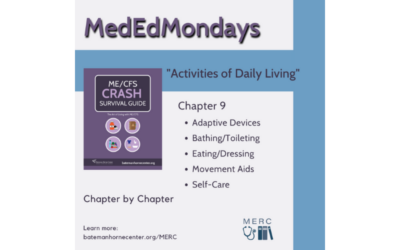
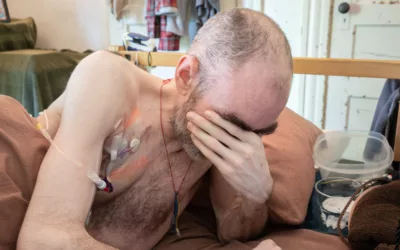
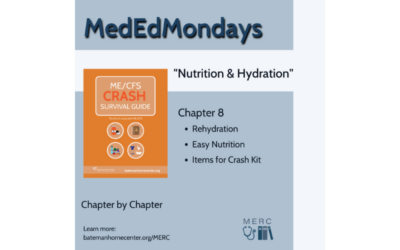
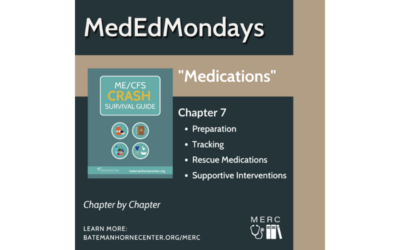
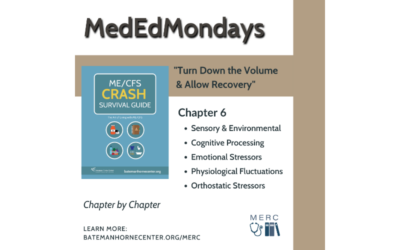
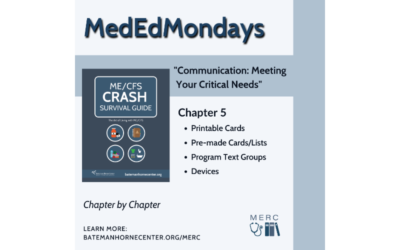
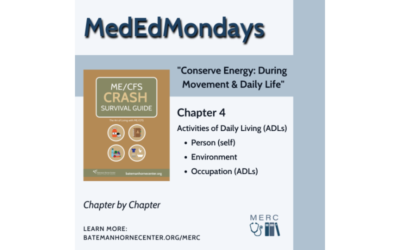
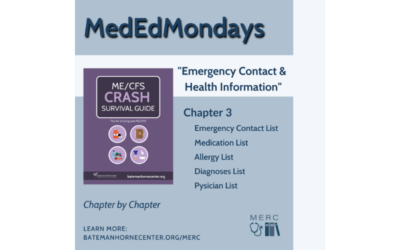


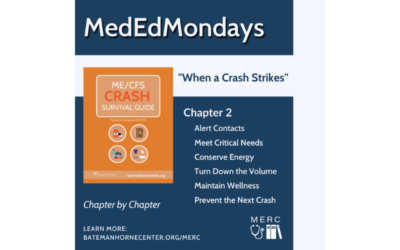
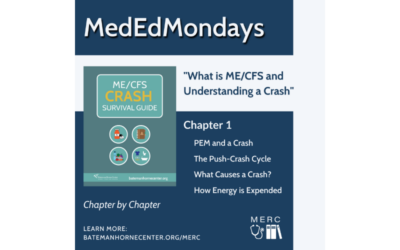
 Lucinda Bateman, MD, is a renowned clinician, researcher, and educator. Her Johns Hopkins University Medical School training instilled an approach to care that she has employed throughout her career - the patient comes first and the unknown or unexplained does not equate to a lack of proper and compassionate care. Since starting her own practice in 2000, she has served on six boards or committees, been the principal investigator for 45 studies, authored/coauthored 40 journal articles, served as adjunct instructor and adjunct assistant professor in the University of Utah Departments of Preventative Medicine, Internal Medicine, and Anesthesiology, and lectured around the world.
Lucinda Bateman, MD, is a renowned clinician, researcher, and educator. Her Johns Hopkins University Medical School training instilled an approach to care that she has employed throughout her career - the patient comes first and the unknown or unexplained does not equate to a lack of proper and compassionate care. Since starting her own practice in 2000, she has served on six boards or committees, been the principal investigator for 45 studies, authored/coauthored 40 journal articles, served as adjunct instructor and adjunct assistant professor in the University of Utah Departments of Preventative Medicine, Internal Medicine, and Anesthesiology, and lectured around the world.